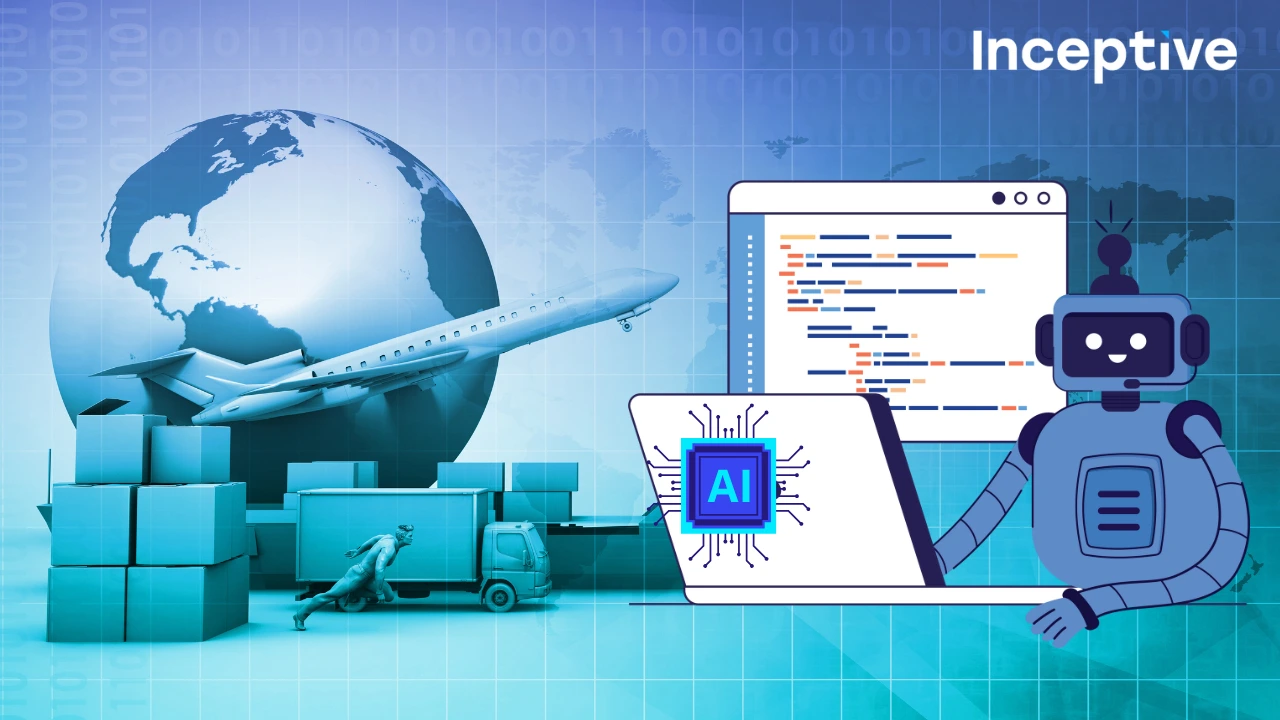The supply chain industry, traditionally reliant on manual processes, is rapidly evolving with the introduction of advanced technologies. Among the most transformative of these is Generative AI. As organizations strive for greater efficiency, sustainability, and agility, Generative AI is emerging as a game-changer in supply chain management (SCM). From demand forecasting and inventory management to route optimization and risk management, Generative AI is significantly enhancing the effectiveness of SCM operations. In this blog, we will delve into how Generative AI is revolutionizing supply chain management, addressing key areas where it’s making the most impact.
What is Generative AI in the Context of Supply Chain Management?

Generative AI refers to a subset of artificial intelligence that involves machine learning models designed to generate new content, make predictions, and optimize processes based on existing data. In supply chain management, Generative AI is utilized to predict trends, improve decision-making processes, and automate various tasks traditionally managed by humans. By analyzing vast datasets, it creates sophisticated models that can foresee potential outcomes, offering actionable insights that drive strategic decisions.
Transforming Demand Forecasting
One of the core pillars of effective supply chain management is demand forecasting. Traditionally, this process relied on historical data, trends, and human intuition. However, Generative AI takes this to a whole new level by leveraging machine learning models to analyze large volumes of data, including historical sales data, market trends, customer behavior, and external factors like weather and political changes.
Generative AI’s ability to predict future demand patterns with greater accuracy is changing the way supply chains operate. With more precise demand forecasts, businesses can optimize their inventory levels, minimize stockouts, and reduce overstocking—leading to significant cost savings and enhanced customer satisfaction. Studies show that businesses using AI for demand forecasting can reduce forecasting errors by up to 50%.
Enhancing Inventory Management with AI
Inventory management has always been a complex task, with businesses needing to balance stock levels, ensure timely deliveries, and minimize holding costs. Generative AI plays a crucial role here by providing predictive insights into optimal stock levels, reorder points, and the ideal timing for stock replenishment.
By analyzing historical sales data, seasonal trends, and even external factors, AI can recommend adjustments to inventory strategies in real-time. This allows businesses to optimize their supply chain, reduce carrying costs, and prevent both stockouts and excessive inventory. Moreover, AI algorithms can be used to predict product lifecycles and demand spikes, ensuring that products are always available when needed, without the risk of overstocking.

AI-Driven Route Optimization for Logistics
In logistics, efficiency is paramount. AI-powered systems are capable of analyzing multiple data points, including traffic patterns, weather forecasts, and delivery schedules, to optimize routes for supply chain deliveries. Generative AI helps in automating route planning and optimizing delivery schedules, enabling businesses to reduce delivery times, fuel consumption, and overall costs.
With real-time data being processed, AI can make dynamic adjustments to delivery routes, ensuring that drivers take the fastest and most cost-effective routes, even when unforeseen circumstances, such as traffic jams or road closures, arise. This reduces operational inefficiencies and enhances customer satisfaction by ensuring on-time deliveries.
Risk Management and Predictive Analytics
Supply chains are often subjected to various risks, including supply disruptions, geopolitical events, natural disasters, and fluctuating demand. Generative AI can significantly mitigate these risks by providing predictive analytics and real-time monitoring.
For example, AI can analyze patterns in historical data to identify potential risks such as raw material shortages or delays in transportation. By forecasting potential disruptions, Generative AI allows businesses to proactively mitigate risks by sourcing alternative suppliers or adjusting inventory levels.
Generative AI’s predictive capabilities can also be harnessed to anticipate fluctuations in demand, enabling supply chains to be more resilient to sudden changes in market conditions. Research by McKinsey & Company suggests that businesses utilizing predictive analytics are 50% more likely to perform better in crisis management compared to their competitors.
AI in Supplier Relationship Management
Supplier relationship management (SRM) has also benefited significantly from Generative AI. By analyzing data from various suppliers, AI can help businesses identify the most reliable and cost-effective suppliers based on a range of criteria such as delivery times, pricing, and product quality.
Additionally, Generative AI models can forecast future supplier performance, allowing businesses to make more informed decisions about which suppliers to work with long-term. This ensures that businesses can negotiate better terms, establish stronger relationships with high-performing suppliers, and reduce the risk of supply chain disruptions.
AI in Customization and Personalization
With the increasing demand for personalized products, AI plays a significant role in enabling supply chains to adapt. Generative AI can help businesses customize products based on customer preferences by analyzing vast amounts of data to identify patterns in consumer behavior. This enables supply chains to become more agile, adjusting quickly to changing consumer demands and providing personalized products in a timely manner.
For example, AI models can recommend the most popular configurations of a product or offer personalized suggestions to customers based on past purchases. This level of customization helps businesses differentiate themselves in the competitive marketplace and enhance customer satisfaction.
Data-Driven Decision Making
One of the most powerful aspects of Generative AI is its ability to provide actionable insights for decision-making. By analyzing historical data, AI models can generate reports that offer recommendations for improving various supply chain processes, from procurement to distribution.
With the help of AI, supply chain managers can make data-driven decisions, eliminating the reliance on guesswork or outdated information. This ensures that every decision is backed by real-time data, optimizing operations and improving overall efficiency.
Sustainability and Environmental Impact
Sustainability is becoming an increasingly important focus for businesses across industries. Generative AI can play a vital role in helping businesses reduce their environmental impact by optimizing transportation routes, reducing waste, and improving energy efficiency in manufacturing processes.
AI-powered supply chains are more capable of predicting the most efficient production schedules, reducing the amount of waste generated during manufacturing. Additionally, Generative AI can help optimize resource allocation, ensuring that materials are used efficiently and energy consumption is minimized.

Statistics Supporting AI’s Impact on Supply Chains

-
A study by PwC found that 79% of executives believe AI will revolutionize supply chains within the next five years.
-
According to a report by Statista, global spending on AI in logistics is expected to reach $11.1 billion by 2025.
-
Research by Gartner indicates that AI-powered supply chain solutions could save up to $2.4 trillion annually by improving efficiency and reducing waste.
FAQs
-
What are the benefits of using Generative AI in supply chain management?
Generative AI provides improved demand forecasting, better inventory management, optimized route planning, predictive analytics for risk management, and stronger supplier relationships. -
How does Generative AI help in inventory management?
AI optimizes inventory levels by predicting demand, determining reorder points, and recommending the best time for stock replenishment, thus reducing stockouts and overstocking. -
Can Generative AI predict supply chain disruptions?
Yes, AI uses predictive analytics to anticipate potential disruptions such as raw material shortages, transportation delays, or sudden demand spikes, helping businesses take proactive actions. -
Is Generative AI cost-effective for supply chains?
While the initial investment can be significant, Generative AI helps businesses reduce costs by optimizing routes, improving inventory management, and streamlining operations, resulting in long-term savings. -
How can AI improve sustainability in supply chains?
AI helps optimize routes, reduce waste, and enhance energy efficiency in manufacturing, contributing to a more sustainable and environmentally friendly supply chain.
Resource Center
These aren’t just blogs – they’re bite-sized strategies for navigating a fast-moving business world. So pour yourself a cup, settle in, and discover insights that could shape your next big move.
What Industries Benefit the Most from AI Development Services?
Top Industries Transforming with AI Development Services Artificial Intelligence is no longer an experimental technology reserved for research labs. It has become a strategic growth engine across global markets. [...]
Should You Hire an In-House or Remote .NET Developer?
In today’s competitive digital ecosystem, the success of your software product often depends on one critical decision — how you hire your .NET developer. Whether you are building enterprise [...]
How Much Does It Cost to Build a Generative AI Solution?
Generative AI is no longer an experimental technology—it is a business accelerator. From AI-powered chatbots and intelligent document automation to custom large language model (LLM) integrations and AI copilots, [...]

